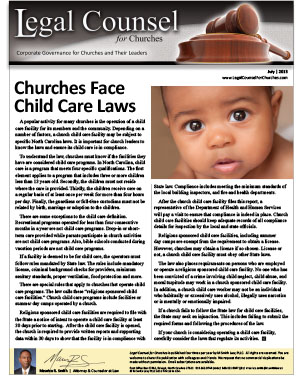A popular activity for many churches is the operation of a child care facility for its members and the community. Depending on a number of factors, a church child care facility may be subject to specific North Carolina laws. It is important for church leaders to know the laws and ensure its child care is in compliance.
To understand the law, churches must know if the facilities they have are considered child care programs. In North Carolina, child care is a program that meets four specific qualifications. The first element applies to a program that includes three or more children less than 13 years old. Secondly, the children must not reside where the care is provided. Thirdly, the children receive care on a regular basis of at least once per week for more than four hours per day. Finally, the guardians or full-time custodians must not be related by birth, marriage or adoption to the children.
There are some exceptions to the child care definition. Recreational programs operated for less than four consecutive months in a year are not child care programs. Drop-in or short- term care provided while parents participate in church activities are not child care programs. Also, bible schools conducted during vacation periods are not child care programs.
If a facility is deemed to be for child care, the operators must follow rules mandated by State law. The rules include mandatory license, criminal background checks for providers, minimum sanitary standards, proper ventilation, food protection and more.
There are special rules that apply to churches that operate child care programs. The law calls these “religious sponsored child care facilities.” Church child care programs include facilities or summer day camps operated by a church.
Religious sponsored child care facilities are required to file with the State a notice of intent to operate a child care facility at least 30 days prior to starting. After the child care facility is opened, the church is required to provide written reports and supporting data within 30 days to show that the facility is in compliance with State law. Compliance includes meeting the minimum standards of the local building inspectors, and fire and health departments.
After the church child care facility files this report, a representative of the Department of Health and Human Services will pay a visit to ensure that compliance is indeed in place. Church child care facilities should keep adequate records of all compliance details for inspection by the local and state officials.
Religious sponsored child care facilities, including summer day camps are exempt from the requirement to obtain a license. However, churches may obtain a license if so chosen. License or not, a church child care facility must obey other State laws.
The law also places requirements on persons who are employed or operate a religious sponsored child care facility. No one who has been convicted of a crime involving child neglect, child abuse, and moral turpitude may work in a church sponsored child care facility. In addition, a church child care worker may not be an individual who habitually or excessively uses alcohol, illegally uses narcotics or is mentally or emotionally impaired.
If a church fails to follow the State law for child care facilities, the State may seek an injunction. This includes failing to submit the required forms and following the procedures of the law.
If your church is considering operating a child care facility, carefully consider the laws that regulate its activities.

